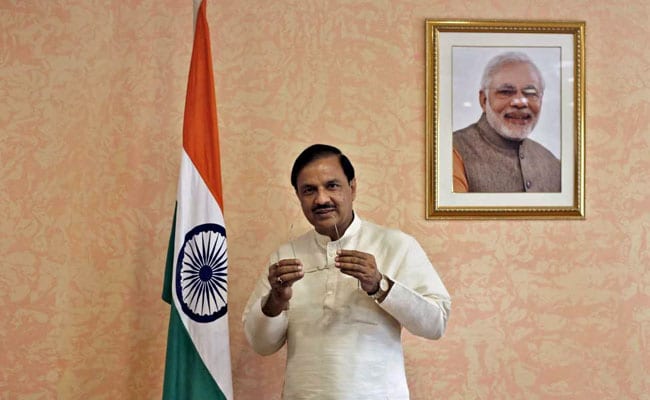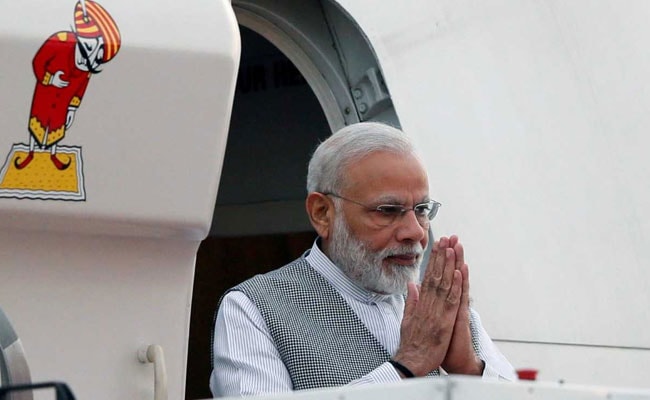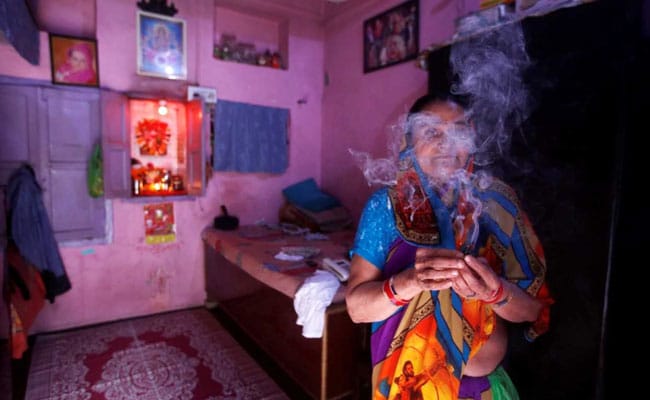
"The true colour of Indian history is saffron," RSS spokesman Manmohan Vaidya told Reuters
- Committee chairman KN Dikshit said he will present a report
- Culture Minister Mahesh Sharma said larger plans to revise history
- Mr Sharma said the findings will enter textbooks, academic research
Did our AI summary help?
Let us know.
New Delhi:
During the first week of January last year, a group of scholars gathered in a white bungalow on a leafy boulevard in central Delhi. The focus of their discussion: how to rewrite the history of the nation.
The government of Prime Minister Narendra Modi had quietly appointed the committee of scholars about six months earlier. Details of its existence are reported here for the first time.
Minutes of the meeting, reviewed by Reuters, and interviews with committee members set out its aims: to use evidence such as archaeological finds and DNA to prove that today's Hindus are directly descended from the land's first inhabitants many thousands of years ago, and make the case that ancient Hindu scriptures are fact not myth.
The committee's chairman, KN Dikshit, told Reuters, "I have been asked to present a report that will help the government rewrite certain aspects of ancient history." The committee's creator, Culture Minister Mahesh Sharma, confirmed in an interview that the group's work was part of larger plans to revise India's history.
For India's Muslims, who have pointed to incidents of religious violence and discrimination since PM Modi took office in 2014, the development is ominous. The head of Muslim party All India Majlis-e-Ittehadul Muslimeen, Asaduddin Owaisi, said his people had "never felt so marginalised in the independent history of India."
"The government," he said, "wants Muslims to live in India as second-class citizens."
"The true colour of Indian history is saffron and to bring about cultural changes we have to rewrite history," said RSS spokesman Manmohan Vaidya to Reuters. The Rashtriya Swayamsevak Sangh (RSS) is the ideological mentor of the BJP.
 Balmukund Pandey, the head of the historical research wing of the RSS, said he meets regularly with Culture Minister Sharma. "The time is now," Mr Pandey said, to restore India's past glory by establishing that ancient Hindu texts are fact not myth.
Balmukund Pandey, the head of the historical research wing of the RSS, said he meets regularly with Culture Minister Sharma. "The time is now," Mr Pandey said, to restore India's past glory by establishing that ancient Hindu texts are fact not myth.
The Culture Minister told Reuters he expects the conclusions of the committee to find their way into school textbooks and academic research. The panel is referred to in government documents as the committee for "holistic study of origin and evolution of Indian culture since 12,000 years before present and its interface with other cultures of the world."
Mr Sharma said this "Hindu first" version of Indian history will be added to a school curriculum which has long taught that people from central Asia arrived in India much more recently, some 3,000 to 4,000 years ago, and transformed the population.
Hindu nationalists and senior figures in PM Modi's party reject the idea that India was forged from a mass migration. They believe that today's Hindu population is directly descended from the land's first inhabitants. Historian Romila Thapar said the question of who first stood on the soil was important to nationalists because "if the Hindus are to have primacy as citizens in a Hindu Rashtra (kingdom), their foundational religion cannot be an imported one." To assert that primacy, nationalists need to claim descent from ancestors and a religion that were indigenous, said Ms Thapar, 86, who taught at Jawaharlal Nehru University in New Delhi for decades and has authored books on ancient Indian history.
Shashi Tharoor, a prominent member of the Congress party, said right wing Hindus are "leading a political campaign over Indian history that seeks to reinvent the idea of India itself." "For seven decades after independence, Indianness rested on faith in the country's pluralism," Mr Tharoor said, but the rise of Hindu nationalism had brought with it a "sense of cultural superiority."
The history committee met in the offices of the director general of the Archaeological Survey of India, a central body that oversees archaeological research. Among the committee's 14 members are bureaucrats and academics.
 Culture Minister Sharma told Reuters he will present the committee's final report to parliament and lobby the nation's Ministry of Human Resource Development to write the findings into school textbooks.
Culture Minister Sharma told Reuters he will present the committee's final report to parliament and lobby the nation's Ministry of Human Resource Development to write the findings into school textbooks.
"We will take every recommendation made by the Culture Ministry seriously," said Prakash Javadekar, who heads the ministry. "Our government is the first government to have the courage to even question the existing version of history that is being taught in schools and colleges."
According to the minutes of the history committee's first meeting, Mr Dikshit, the chairman, said it was "essential to establish a correlation" between ancient Hindu scriptures and evidence that Indian civilization stretches back many thousands of years. Doing so would help bolster both conclusions the committee wants to reach: that events described in Hindu texts are real, and today's Hindus are descendants of those times.
The minutes and interviews with committee members lay out a comprehensive campaign to achieve this, including the dating of archaeological sites and DNA testing of human remains.
Culture Minister Sharma told Reuters he wants to establish that Hindu scriptures are factual accounts. Speaking of the Ramayana, the epic that follows the journey of Lord Ram, Mr Sharma said: "I worship Ramayana and I think it is a historical document. People who think it is fiction are absolutely wrong."
Mr Sharma said it was a priority to prove through archaeological research the existence of a mystical river, the Saraswati, that is mentioned in another ancient scripture, the Vedas. Other projects include examining artifacts from locations in scriptures, mapping the dates of astrological events mentioned in these texts and excavating the sites of battles in another epic, the Mahabharata, according to Sharma and minutes of the committee's meeting.
 "If the Koran and Bible are considered as part of history, then what is the problem in accepting our Hindu religious texts as the history of India?" said Mr Sharma.
"If the Koran and Bible are considered as part of history, then what is the problem in accepting our Hindu religious texts as the history of India?" said Mr Sharma.
PM Modi did not order the committee's creation - it was instigated by Mr Sharma, government documents show - but its mission is in keeping with his outlook. During the 2014 inauguration of a hospital in Mumbai, the PM pointed to the scientific achievements documented by ancient religious texts and said: "We worship Lord Ganesha, and maybe there was a plastic surgeon at that time who kept the head of an elephant on the torso of a human. There are many areas where our ancestors made large contributions."
Nine of 12 history committee members interviewed by Reuters said they have been tasked with matching archaeological and other evidence with ancient Indian scriptures, or establishing that Indian civilization is much older than is widely known. The others confirmed their membership but declined to discuss the group's activities. The committee includes a geologist, archaeologists, scholars of the ancient Sanskrit language and two bureaucrats.
One of the Sanskrit scholars, Santosh Kumar Shukla, a professor at Jawaharlal Nehru University in New Delhi, told Reuters he believes India's Hindu culture is millions of years old. Another committee member, Ramesh Chand Sharma, former head of the linguistics department at Delhi University, said he would take a strictly scientific approach. "I don't subscribe to any ideology," he said.
During the last three years, Mr Sharma said, his ministry has organised hundreds of workshops and seminars across the country "to prove the supremacy of our glorious past." The aim, he said, is to build a fresh narrative to balance the liberal and secular philosophy espoused by India's first Prime Minister, Jawaharlal Nehru, and furthered by successive governments.
The government of Prime Minister Narendra Modi had quietly appointed the committee of scholars about six months earlier. Details of its existence are reported here for the first time.
Minutes of the meeting, reviewed by Reuters, and interviews with committee members set out its aims: to use evidence such as archaeological finds and DNA to prove that today's Hindus are directly descended from the land's first inhabitants many thousands of years ago, and make the case that ancient Hindu scriptures are fact not myth.
The committee's chairman, KN Dikshit, told Reuters, "I have been asked to present a report that will help the government rewrite certain aspects of ancient history." The committee's creator, Culture Minister Mahesh Sharma, confirmed in an interview that the group's work was part of larger plans to revise India's history.
For India's Muslims, who have pointed to incidents of religious violence and discrimination since PM Modi took office in 2014, the development is ominous. The head of Muslim party All India Majlis-e-Ittehadul Muslimeen, Asaduddin Owaisi, said his people had "never felt so marginalised in the independent history of India."
"The government," he said, "wants Muslims to live in India as second-class citizens."
"The true colour of Indian history is saffron and to bring about cultural changes we have to rewrite history," said RSS spokesman Manmohan Vaidya to Reuters. The Rashtriya Swayamsevak Sangh (RSS) is the ideological mentor of the BJP.

Culture Minister Mahesh Sharma said the group's work was part of larger plans to revise India's history (Reuters)
The Culture Minister told Reuters he expects the conclusions of the committee to find their way into school textbooks and academic research. The panel is referred to in government documents as the committee for "holistic study of origin and evolution of Indian culture since 12,000 years before present and its interface with other cultures of the world."
Mr Sharma said this "Hindu first" version of Indian history will be added to a school curriculum which has long taught that people from central Asia arrived in India much more recently, some 3,000 to 4,000 years ago, and transformed the population.
Hindu nationalists and senior figures in PM Modi's party reject the idea that India was forged from a mass migration. They believe that today's Hindu population is directly descended from the land's first inhabitants. Historian Romila Thapar said the question of who first stood on the soil was important to nationalists because "if the Hindus are to have primacy as citizens in a Hindu Rashtra (kingdom), their foundational religion cannot be an imported one." To assert that primacy, nationalists need to claim descent from ancestors and a religion that were indigenous, said Ms Thapar, 86, who taught at Jawaharlal Nehru University in New Delhi for decades and has authored books on ancient Indian history.
Shashi Tharoor, a prominent member of the Congress party, said right wing Hindus are "leading a political campaign over Indian history that seeks to reinvent the idea of India itself." "For seven decades after independence, Indianness rested on faith in the country's pluralism," Mr Tharoor said, but the rise of Hindu nationalism had brought with it a "sense of cultural superiority."
The history committee met in the offices of the director general of the Archaeological Survey of India, a central body that oversees archaeological research. Among the committee's 14 members are bureaucrats and academics.

PM Narendra Modi did not order the committee's creation - it was instigated by Culture Minister Mahesh Sharma, government documents show - but its mission is in keeping with his outlook. (Reuters)
"We will take every recommendation made by the Culture Ministry seriously," said Prakash Javadekar, who heads the ministry. "Our government is the first government to have the courage to even question the existing version of history that is being taught in schools and colleges."
According to the minutes of the history committee's first meeting, Mr Dikshit, the chairman, said it was "essential to establish a correlation" between ancient Hindu scriptures and evidence that Indian civilization stretches back many thousands of years. Doing so would help bolster both conclusions the committee wants to reach: that events described in Hindu texts are real, and today's Hindus are descendants of those times.
The minutes and interviews with committee members lay out a comprehensive campaign to achieve this, including the dating of archaeological sites and DNA testing of human remains.
Culture Minister Sharma told Reuters he wants to establish that Hindu scriptures are factual accounts. Speaking of the Ramayana, the epic that follows the journey of Lord Ram, Mr Sharma said: "I worship Ramayana and I think it is a historical document. People who think it is fiction are absolutely wrong."
Mr Sharma said it was a priority to prove through archaeological research the existence of a mystical river, the Saraswati, that is mentioned in another ancient scripture, the Vedas. Other projects include examining artifacts from locations in scriptures, mapping the dates of astrological events mentioned in these texts and excavating the sites of battles in another epic, the Mahabharata, according to Sharma and minutes of the committee's meeting.

Nine of 12 history committee members interviewed by Reuters said they have been tasked with matching archaeological and other evidence with ancient Indian scriptures, or establishing that Indian civilization is much older than is widely known. (Reuters)
PM Modi did not order the committee's creation - it was instigated by Mr Sharma, government documents show - but its mission is in keeping with his outlook. During the 2014 inauguration of a hospital in Mumbai, the PM pointed to the scientific achievements documented by ancient religious texts and said: "We worship Lord Ganesha, and maybe there was a plastic surgeon at that time who kept the head of an elephant on the torso of a human. There are many areas where our ancestors made large contributions."
Nine of 12 history committee members interviewed by Reuters said they have been tasked with matching archaeological and other evidence with ancient Indian scriptures, or establishing that Indian civilization is much older than is widely known. The others confirmed their membership but declined to discuss the group's activities. The committee includes a geologist, archaeologists, scholars of the ancient Sanskrit language and two bureaucrats.
One of the Sanskrit scholars, Santosh Kumar Shukla, a professor at Jawaharlal Nehru University in New Delhi, told Reuters he believes India's Hindu culture is millions of years old. Another committee member, Ramesh Chand Sharma, former head of the linguistics department at Delhi University, said he would take a strictly scientific approach. "I don't subscribe to any ideology," he said.
During the last three years, Mr Sharma said, his ministry has organised hundreds of workshops and seminars across the country "to prove the supremacy of our glorious past." The aim, he said, is to build a fresh narrative to balance the liberal and secular philosophy espoused by India's first Prime Minister, Jawaharlal Nehru, and furthered by successive governments.
Track Latest News Live on NDTV.com and get news updates from India and around the world

